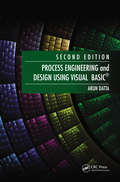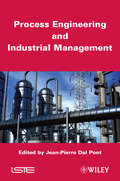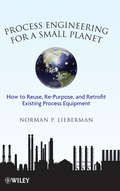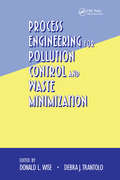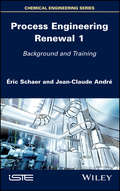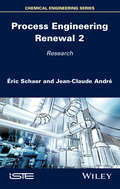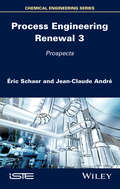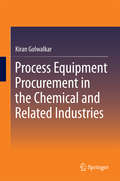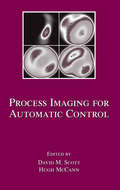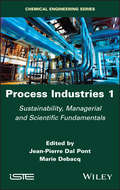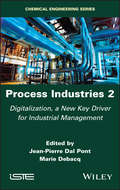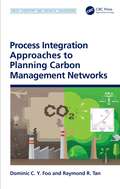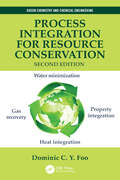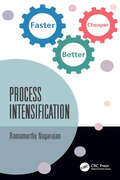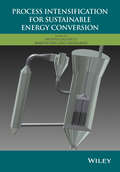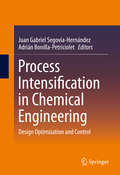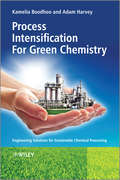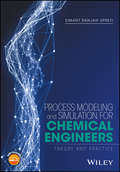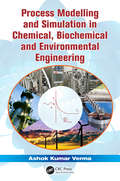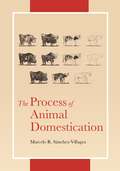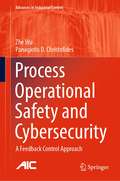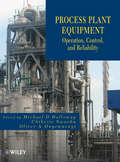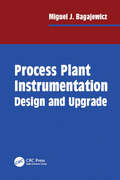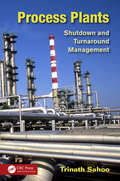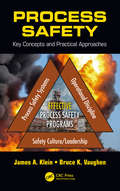- Table View
- List View
Process Engineering and Design Using Visual Basic
by Arun DattaSoftware tools are a great aid to process engineers, but too much dependence on such tools can often lead to inappropriate and suboptimal designs. Reliance on software is also a hindrance without a firm understanding of the principles underlying its operation, since users are still responsible for devising the design.In Process Engineering and Desi
Process Engineering and Industrial Management
by Jean-Pierre Dal PontProcess Engineering, the science and art of transforming raw materials and energy into a vast array of commercial materials, was conceived at the end of the 19th Century. Its history in the role of the Process Industries has been quite honorable, and techniques and products have contributed to improve health, welfare and quality of life. Today, industrial enterprises, which are still a major source of wealth, have to deal with new challenges in a global world. They need to reconsider their strategy taking into account environmental constraints, social requirements, profit, competition, and resource depletion."Systems thinking" is a prerequisite from process development at the lab level to good project management. New manufacturing concepts have to be considered, taking into account LCA, supply chain management, recycling, plant flexibility, continuous development, process intensification and innovation.This book combines experience from academia and industry in the field of industrialization, i.e. in all processes involved in the conversion of research into successful operations. Enterprises are facing major challenges in a world of fierce competition and globalization. Process engineering techniques provide Process Industries with the necessary tools to cope with these issues. The chapters of this book give a new approach to the management of technology, projects and manufacturing.ContentsPart 1: The Company as of Today1. The Industrial Company: its Purpose, History, Context, and its Tomorrow?, Jean-Pierre Dal Pont.2. The Two Modes of Operation of the Company - Operational and Entrepreneurial, Jean-Pierre Dal Pont.3. The Strategic Management of the Company: Industrial Aspects, Jean-Pierre Dal Pont.Part 2: Process Development and Industrialization4. Chemical Engineering and Process Engineering, Jean-Pierre Dal Pont.5. Foundations of Process Industrialization, Jean-François Joly.6. The Industrialization Process: Preliminary Projects, Jean-Pierre Dal Pont and Michel Royer.7. Lifecycle Analysis and Eco-Design: Innovation Tools for Sustainable Industrial Chemistry, Sylvain Caillol.8. Methods for Design and Evaluation of Sustainable Processes and Industrial Systems, Catherine Azzaro-Pantel.9. Project Management Techniques: Engineering, Jean-Pierre Dal Pont.Part 3: The Necessary Adaptation of the Company for the Future10. Japanese Methods, Jean-Pierre Dal Pont.11. Innovation in Chemical Engineering Industries, Oliver Potier and Mauricio Camargo.12. The Place of Intensified Processes in the Plant of the Future, Laurent Falk.13. Change Management, Jean-Pierre Dal Pont.14. The Plant of the Future, Jean-Pierre Dal Pont.
Process Engineering for a Small Planet
by Norman P. LiebermanMethods for more planet-friendly process engineeringOur earth is just one big, complex Process Facility with limited air, water, and mineral resources. It responds to a number of process variables--among them, humanity and the environmental effects of our carbon consumption. What can professionals in the Hydrocarbon Process Industry do to retard environmental degradation? Rather than looking to exotic technology for solutions, Process Engineering for a Small Planet details ready-at-hand methods that the process engineer can employ to help combat the environmental crisis.Drawing from the author's professional experience working with petroleum refineries petroleum refineries, petrochemical plants, and natural gas wells, this handbook explains how to operate and retrofit process facilities to:Reuse existing process equipmentSave energyReduce greenhouse gas emissionsExpand plant capacity without installing new equipmentReduce corrosion and equipment failuresCovering topics from expanding fractionator and compressor capacity and vacuum tower heater expansion to minimizing process water consumption and increasing centrifugal pump capacity, Process Engineering for a Small Planet offers big ideas for saving our small planet.
Process Engineering for Pollution Control and Waste Minimization (Environmental Science & Pollution)
by Donald L. WiseOffers up-to-date technical information on current and potential pollution control and waste minimization practices, providing industry-specific case studies, techniques and models.
Process Engineering Renewal 1: Background and Training
by Éric Schaer Jean-Claude AndréProcess engineering emerged at the beginning of the 20th Century and has become an essential scientific discipline for the matter and energy processing industries. Its success is incontrovertible, with the exponential increase in techniques and innovations. Rapid advances in new technologies such as artificial intelligence, as well as current societal needs – sustainable development, climate change, renewable energy, the environment – are developments that must be taken into account in industrial renewal. Process Engineering Renewal 1 – the first volume of three – focuses on training, demonstrating the need for innovation in order for the field to have a framework that is sustainable, in a highly changeable world.
Process Engineering Renewal 2: Research
by Eric Schaer Jean-Claude AndreThe chemical processes initially consisted of non-scientific extrapolation methods from the "laboratory". Coming from the oil industry, chemical engineering, now process engineering (material and energy transformation) has introduced scientific rationality in the development of more optimal processes both in financial terms and saving material and energy. At the end of the twentieth century, heavy trends force us to modify our ways of doing matter and/or energies: depletion of reserves, pollution, globalization, artificial intelligence, public perception of risks, etc. Commodities continue to be produced locally while higher value-added products can come from many countries around the world. These external pressures on training and research in the field require major breaks that are the subject of the book.
Process Engineering Renewal 3: Prospects
by Eric Schaer Jean-Claude AndreThe chemical processes initially consisted of non-scientific extrapolation methods from the "laboratory". Coming from the oil industry, chemical engineering, now process engineering (material and energy transformation) has introduced scientific rationality in the development of more optimal processes both in financial terms and saving material and energy. At the end of the twentieth century, heavy trends force us to modify our ways of doing matter and/or energies: depletion of reserves, pollution, globalization, artificial intelligence, public perception of risks, etc. Commodities continue to be produced locally while higher value-added products can come from many countries around the world. These external pressures on training and research in the field require major breaks that are the subject of the book.
Process Equipment Procurement in the Chemical and Related Industries
by Kiran GolwalkarThis concise volume explains when to procure new equipment, how to prepare specifications for floating inquiries, and guidelines for detailed technical discussions with vendors in the chemical and related industries. It covers the common equipment and supplies used in chemical plants, refineries-please delete reference to refineries, and effluent treatment facilities such as pumps, blowers, reactors, heat exchangers, waste heat recovery boilers, heat and acid resistant lining etc. The book serves as a checklist to the plant managements for procurement of the correct equipment in the most efficient timeframe insuring that projects are not delayed due to long time required for procurement of new equipment.
Process Imaging For Automatic Control (Electrical and Computer Engineering)
by David M. Scott Hugh McCannAs industrial processes and their corresponding control models increase in complexity, the data provided by traditional point sensors is no longer adequate to ensure product quality and cost-effective operation. Process Imaging for Automatic Control demonstrates how in-process imaging technologies surpass the limitations of traditional monitoring systems by providing real-time multidimensional measurement and control data. Combined with suitable data extraction and control schemes, such systems can optimize the performance of a wide variety of industrial processes.Contributed by leading international experts, Process Imaging for Automatic Control offers authoritative, comprehensive coverage of this new area of process control technology, including:Basic goals of process modeling and their application to automatic control Direct imaging devices and applications, such as machine vision and spatial measurement of flow velocity, pressure, shear, pH, and temperature Various techniques, hardware implementations, and image reconstruction methods for process tomography Image enhancement and restoration State estimation methods State space control system models, control strategies, and implementation issues Five chapters devoted to case studies and advanced applicationsFrom theory to practical implementation, this book is the first to treat the entire range of imaging techniques and their application to process control. Supplying broad coverage with more than 270 illustrations and nearly 700 cited references, it presents an accessible introduction to this rapidly growing, interdisciplinary technology.
Process Industries 1: Sustainability, Managerial and Scientific Fundamentals
by Jean-Pierre Dal Pont Marie DebacqOf crucial economic and societal importance, process industries transform matter by chemical, physical or biological means. They cover broad fields such as chemistry, oil, pharmacy, metallurgy and agri-food, to name a few. As a result of knowledge exchange between the academic and industrial worlds, Process Industries 1 decrypts the operations and technical management of these industries in order to formulate and manufacture products with use-value, in a sustainable way. Using concrete examples, this book presents the fundamentals for defining the reaction and purification conditions that form the basis of chemical engineering. The unit operations – the technological building blocks of the production units – are the subject of scientific and technical descriptions supplemented by numerous videos. Frameworks, written by well-known specialists, provide a deep understanding of topics related to these themes. Process Industries 1 is intended for students, teachers, professionals and decision-makers interested in learning more about these industries.
Process Industries 2: Digitalization, a New Key Driver for Industrial Management
by Jean-Pierre Dal Pont Marie DebacqAs a result of knowledge exchange between the academic and industrial worlds, this book analyzes the process industries impacted by the digital revolution that accompanies the ongoing energy and environmental transitions. Process Industries 2 first discusses bio-industries and analyzes the development of products of microbial origin. It then studies all the stages of industrialization that facilitate the progress from research to the production of a finished product, as well as industrial management techniques. Using concrete examples, this book presents the instruments of the digital revolution (artificial intelligence, virtual reality, augmented reality, the Internet of Things, digital twins), while analyzing their impact on the supply chain and operators. Boxes within the book, written by recognized specialists, invite both students and professionals, who are faced with a changing world, to reflect on the industry and the world of tomorrow.
Process Integration Approaches to Planning Carbon Management Networks (Green Chemistry and Chemical Engineering)
by Dominic C. Foo Raymond R. TanProcess Integration Approaches to Planning Carbon Management Networks provides a comprehensive treatment of carbon emissions pinch analysis (CEPA), covering the fundamentals as well as more advanced variants based on mathematical programming. A significant portion of the book is dedicated to case studies that provide a range of examples to demonstrate how CEPA can be applied to practical energy planning problems. Selected chapters also include electronic supplements (e.g., spreadsheet templates and software code) to aid the reader in applying these methods to new sets of data. This book is ideal for academic researchers and graduate students interested in carbon-constrained energy planning models and applications. This book Provides essential information on CEPA and mathematical programming Gives illustrative examples and case studies drawn from contemporary climatic issues Covers state-of-the-art methodological developments Discusses about applications in various countries Offers additional support through supplementary spreadsheet templates and software code Professor Dominic Foo is a professor of process design and integration at the University of Nottingham Malaysia. He is a fellow of the Institution of Chemical Engineers, a fellow of the Academy of Science Malaysia, a chartered engineer with the UK Engineering Council, and a professional engineer with the Board of Engineers Malaysia. He works on process integration for resource conservation and CO2 reduction, with more than 400 published works. Prof. Foo is the co-editor-in-chief for Process Integration and Optimization for Sustainability, subject editor for Process Safety & Environmental Protection, and an editorial board member for several other renowned journals. Raymond R. Tan is a professor of chemical engineering and university fellow at De La Salle University, Philippines. He is also a member of the National Academy of Science and Technology of the Philippines. His main areas of research are process systems engineering and process integration, where he has over 300 published works. Prof. Tan received his BS and MS degrees in chemical engineering and PhD in mechanical engineering from De La Salle University. He is also a co-editor-in-chief of Process Integration and Optimization for Sustainability, subject editor of Sustainable Production and Consumption, and an editorial board member of Clean Technologies and Environmental Policy.
Process Integration for Resource Conservation (Green Chemistry and Chemical Engineering)
by Dominic C.Y. FooTo achieve environmental sustainability in industrial plants, resource conservation activities such as material recovery have begun incorporating process integration techniques for reusing and recycling water, utility gases, solvents, and solid waste. Process Integration for Resource Conservation presents state-of-the-art, cost-effective techniques, including pinch analysis and mathematical optimization, for numerous conservation problems. The second edition of this best-seller adds new chapters on heat integration and retrofitting of resource conservation networks and features multiple optimization examples via downloadable MS Excel spreadsheets. Emphasizes the goal of setting performance targets ahead of detailed design following the holistic philosophy of process integration Explains various industrial examples step by step and offers demo software and other materials online Features a wealth of industrial case studies Adds chapters on heat integration, combined heat and power, heat-integrated water network, and retrofit of resource conservation network Adds new optimization examples and downloadable MS Excel files on superstructural approaches and automated targeting models for direct reuse, recycle and regeneration Ideal for students preparing for real-world work as well as industrial practitioners in chemical processing, the text provides a systematic guide to the latest process integration techniques for performing material recovery in process plants. The book features a solutions manual, lecture slides, and figure slides for adopting professors to use in their courses.
Process Intensification: Faster, Better, Cheaper
by Ramamurthy NagarajanProcess Intensification: Faster, Better, Cheaper presents basic concepts and applications of process intensification (PI) and links their common effects across processes. It defines two fundamental parameters, PI factor, and Cost Impact (CI) factor, and uses these to analyze various applications where Process Intensification has been carried out.Process Intensification principles have, in the past, been applied to diverse fields, ranging from biodiesel production to offshore processing, and this book unifies these aspects to identify the common factors that drive process enhancements. Each chapter investigates a specific application, discusses the key PI principles, and includes problem sets and examples. The book also provides case studies and realworld examples throughout the chapters.Features: Explores Cost Impact of Process Intensification, and their relative magnitudes, as a universal metric Covers a range of industrial applications, including heat and mass transfer, atomization and comminution, and enhanced oil recovery Discusses the application of Process Intensification for clean coal technology and environmental remediation Includes end-of-chapter problems, examples, and case studies The book is intended for senior undergraduate chemical and mechanical engineering students taking courses in Process Design, Process Optimization, Process Synthesis, and Process Intensification.Instructors will be able to utilize a Solutions Manual and Lecture Slides for their course.The eBook+ version includes the following enhancements: Open-ended essay questions to encourage conceptual thinking and apply new information Pop-up explanations of selected concepts and terms throughout the chapters Interactive definition flashcards that summarize key takeaways at the end of the chapter Quizzes within chapters to help readers refresh their knowledge
Process Intensification for Sustainable Energy Conversion
by Fausto Gallucci Martin van Sint AnnalandThis book addresses the application of process intensification to sustainable energy production, combining two very topical subject areas. Due to the increasing process of petroleum, sustainable energy production technologies must be developed, for example bioenergy, blue energy, chemical looping combustion, concepts for CO2 capture etc. Process intensification offers significant competitive advantages, because it provides more efficient processes, leading to outstanding cost reduction, increased productivity and more environment-friendly processes.
Process Intensification in Chemical Engineering
by Juan Gabriel Segovia-Hernández Adrián Bonilla-PetricioletThis book will provide researchers and graduate students withan overview of the recent developments and applications of processintensification in chemical engineering. It will also allow the readers toapply the available intensification techniques to their processes and specificproblems. The content of this book can be readily adopted as part of specialcourses on process control, design, optimization and modelling aimed at seniorundergraduate and graduate students. This book will be a useful resource forresearchers in process system engineering as well as for practitionersinterested in applying process intensification approaches to real-life problemsin chemical engineering and related areas.
Process Intensification Technologies for Green Chemistry
by Adam Harvey Kamelia BoodhooThe successful implementation of greener chemical processes relies not only on the development of more efficient catalysts for synthetic chemistry but also, and as importantly, on the development of reactor and separation technologies which can deliver enhanced processing performance in a safe, cost-effective and energy efficient manner. Process intensification has emerged as a promising field which can effectively tackle the challenges of significant process enhancement, whilst also offering the potential to diminish the environmental impact presented by the chemical industry.Following an introduction to process intensification and the principles of green chemistry, this book presents a number of intensified technologies which have been researched and developed, including case studies to illustrate their application to green chemical processes.Topics covered include:* Intensified reactor technologies: spinning disc reactors, microreactors, monolith reactors, oscillatory flow reactors, cavitational reactors* Combined reactor/separator systems: membrane reactors, reactive distillation, reactive extraction, reactive absorption* Membrane separations for green chemistry * Industry relevance of process intensification, including economics and environmental impact, opportunities for energy saving, and practical considerations for industrial implementation.Process Intensification for Green Chemistry is a valuable resource for practising engineers and chemists alike who are interested in applying intensified reactor and/or separator systems in a range of industries to achieve green chemistry principles.
Process Modeling and Simulation for Chemical Engineers: Theory and Practice
by Simant R. UpretiThis book provides a rigorous treatment of the fundamental concepts and techniques involved in process modeling and simulation. The book allows the reader to: (i) Get a solid grasp of “under-the-hood” mathematical results (ii) Develop models of sophisticated processes (iii) Transform models to different geometries and domains as appropriate (iv) Utilize various model simplification techniques (v) Learn simple and effective computational methods for model simulation (vi) Intensify the effectiveness of their research Modeling and Simulation for Chemical Engineers: Theory and Practice begins with an introduction to the terminology of process modeling and simulation. Chapters 2 and 3 cover fundamental and constitutive relations, while Chapter 4 on model formulation builds on these relations. Chapters 5 and 6 introduce the advanced techniques of model transformation and simplification. Chapter 7 deals with model simulation, and the final chapter reviews important mathematical concepts. Presented in a methodical, systematic way, this book is suitable as a self-study guide or as a graduate reference, and includes examples, schematics and diagrams to enrich understanding. End of chapter problems (with solutions and computer software available online) are designed to further stimulate readers to apply the newly-learned concepts. End of chapter problems (with solutions and computer software available online www.wiley.com/go/upreti/pms_for_chemical_engineers) are designed to further stimulate readers to apply the newly learned concepts.
Process Modelling and Simulation in Chemical, Biochemical and Environmental Engineering
by Ashok Kumar VermaThe use of simulation plays a vital part in developing an integrated approach to process design. By helping save time and money before the actual trial of a concept, this practice can assist with troubleshooting, design, control, revamping, and more. Process Modelling and Simulation in Chemical, Biochemical and Environmental Engineering explores ef
The Process of Animal Domestication
by Marcelo Sánchez-VillagraThe first modern scholarly synthesis of animal domesticationAcross the globe and at different times in the past millennia, the evolutionary history of domesticated animals has been greatly affected by the myriad, complex, and diverse interactions humans have had with the animals closest to them. The Process of Animal Domestication presents a broad synthesis of this subject, from the rich biology behind the initial stages of domestication to how the creation of breeds reflects cultural and societal transformations that have impacted the biosphere.Marcelo Sánchez-Villagra draws from a wide range of fields, including evolutionary biology, zooarchaeology, ethnology, genetics, developmental biology, and evolutionary morphology to provide a fresh perspective to this classic topic. Relying on various conceptual and technical tools, he examines the natural history of phenotypes and their developmental origins. He presents case studies involving mammals, birds, fish, and insect species, and he highlights the importance of domestication for the comprehension of evolution, anatomy, ontogeny, and dozens of fundamental biological processes.Bringing together the most current developments, The Process of Animal Domestication will interest a wide range of readers, from evolutionary biologists, developmental biologists, and geneticists to anthropologists and archaeologists.
Process Operational Safety and Cybersecurity: A Feedback Control Approach (Advances in Industrial Control)
by Zhe Wu Panagiotis D. ChristofidesThis book is focused on the development of rigorous, yet practical, methods for the design of advanced process control systems to improve process operational safety and cybersecurity for a wide range of nonlinear process systems. Process Operational Safety and Cybersecurity develops designs for novel model predictive control systems accounting for operational safety considerations, presents theoretical analysis on recursive feasibility and simultaneous closed-loop stability and safety, and discusses practical considerations including data-driven modeling of nonlinear processes, characterization of closed-loop stability regions and computational efficiency. The text then shifts focus to the design of integrated detection and model predictive control systems which improve process cybersecurity by efficiently detecting and mitigating the impact of intelligent cyber-attacks. The book explores several key areas relating to operational safety and cybersecurity including: machine-learning-based modeling of nonlinear dynamical systems for model predictive control;a framework for detection and resilient control of sensor cyber-attacks for nonlinear systems; insight into theoretical and practical issues associated with the design of control systems for process operational safety and cybersecurity; and a number of numerical simulations of chemical process examples and Aspen simulations of large-scale chemical process networks of industrial relevance. A basic knowledge of nonlinear system analysis, Lyapunov stability techniques, dynamic optimization, and machine-learning techniques will help readers to understand the methodologies proposed. The book is a valuable resource for academic researchers and graduate students pursuing research in this area as well as for process control engineers.Advances in Industrial Control reports and encourages the transfer of technology in control engineering. The rapid development of control technology has an impact on all areas of the control discipline. The series offers an opportunity for researchers to present an extended exposition of new work in all aspects of industrial control.
Process Plant Equipment: Operation, Control, and Reliability
by Michael Holloway Chikezie Nwaoha Oliver A. Onyewuenyi“Process Plant Equipment Book is another great publication from Wiley as a reference book for final year students as well as those who will work or are working in chemical production plants and refinery…” -Associate Prof. Dr. Ramli Mat, Deputy Dean (Academic), Faculty of Chemical Engineering, Universiti Teknologi Malaysia “…give[s] readers access to both fundamental information on process plant equipment and to practical ideas, best practices and experiences of highly successful engineers from around the world… The book is illustrated throughout with numerous black & white photos and diagrams and also contains case studies demonstrating how actual process plants have implemented the tools and techniques discussed in the book. An extensive list of references enables readers to explore each individual topic in greater depth…” –Stainless Steel World and Valve World, November 2012 Discover how to optimize process plant equipment, from selection to operation to troubleshooting From energy to pharmaceuticals to food, the world depends on processing plants to manufacture the products that enable people to survive and flourish. With this book as their guide, readers have the information and practical guidelines needed to select, operate, maintain, control, and troubleshoot process plant equipment so that it is efficient, cost-effective, and reliable throughout its lifetime. Following the authors' careful explanations and instructions, readers will find that they are better able to reduce downtime and unscheduled shutdowns, streamline operations, and maximize the service life of processing equipment. Process Plant Equipment: Operation, Control, and Reliability is divided into three sections: Section One: Process Equipment Operations covers such key equipment as valves, pumps, cooling towers, conveyors, and storage tanks Section Two: Process Plant Reliability sets forth a variety of tested and proven tools and methods to assess and ensure the reliability and mechanical integrity of process equipment, including failure analysis, Fitness-for-Service assessment, engineering economics for chemical processes, and process component function and performance criteria Section Three: Process Measurement, Control, and Modeling examines flow meters, process control, and process modeling and simulation Throughout the book, numerous photos and diagrams illustrate the operation and control of key process equipment. There are also case studies demonstrating how actual process plants have implemented the tools and techniques discussed in the book. At the end of each chapter, an extensive list of references enables readers to explore each individual topic in greater depth. In summary, this text offers students, process engineers, and plant managers the expertise and technical support needed to streamline and optimize the operation of process plant equipment, from its initial selection to operations to troubleshooting.
Process Plant Instrumentation: Design and Upgrade
by Miguel J. BagajewiczThis is the first in-depth presentation in book form of current analytical methods for optimal design, selection and evaluation of instrumentation for process plants. The presentation is clear, concise and systematic-providing process engineers with a valuable tool for improving quality, costs, safety, loss prevention, and production accounting.
Process Plants: Shutdown and Turnaround Management
by Trinath SahooWith large amounts of revenue at stake, process industries are focusing more on turnaround management as they strive to lengthen the interval between turnarounds. This book outlines a strategy to execute optimized shutdown and turnaround by changing plant operating conditions and inspection techniques. Because shutdown cost for a petroleum refinery is normally 30 percent higher than annual maintenance costs, this book details how to manage the more favorable turnaround option. The author explores different aspects, including philosophy, planning and scheduling, estimation, contractor management, and execution.
Process Safety: Key Concepts and Practical Approaches
by James A. Klein Bruce K. VaughenEffective process safety programs consist of three interrelated foundations—safety culture and leadership, process safety systems, and operational discipline—designed to prevent serious injuries and incidents resulting from toxic releases, fires, explosions, and uncontrolled reactions. Each of these foundations is important and one missing element can cause poor process safety performance. Process Safety: Key Concepts and Practical Approaches takes a systemic approach to the traditional process safety elements that have been identified for effective process safety programs. More effective process safety risk reduction efforts are achieved when these process safety systems, based on desired activities and results rather than by specific elements, are integrated and organized in a systems framework. This book provides key concepts, practical approaches, and tools for establishing and maintaining effective process safety programs to successfully identify, evaluate, and manage process hazards. It introduces process safety systems in a way that helps readers understand the purpose, design, and everyday use of overall process safety system requirements. Understanding what the systems are intended to achieve, understanding why they have been designed and implemented in a specific way, and understanding how they should function day-to-day is essential to ensure continued safe and reliable operations.
